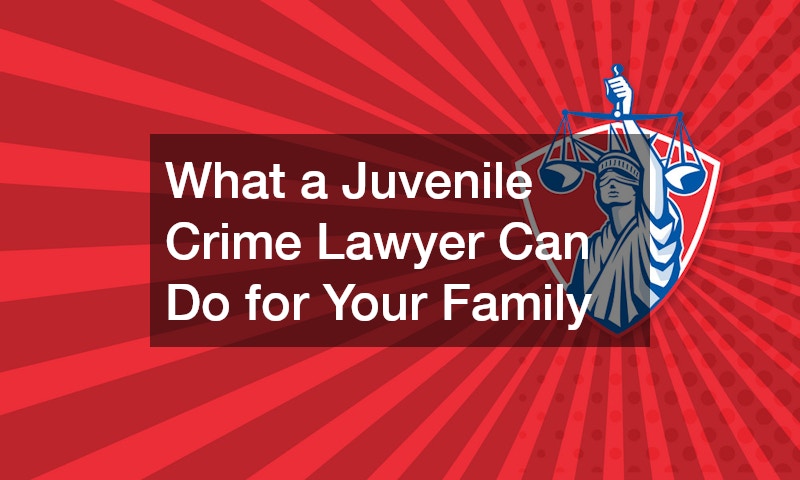Facing legal problems as a family can be an overwhelming experience, particularly when a young family member is involved. Juvenile crime is a complex area of the law that demands specialized knowledge and understanding. This is where a Juvenile Crime Lawyer becomes indispensable. They provide more than just legal representation—they can be a crucial ally and counselor to both the accused and their family.
In this article, we’ll delve into what a Juvenile Crime Lawyer can do for your family and why their role is invaluable.
The Role of a Juvenile Crime Lawyer
Juvenile Crime Lawyers specialize in defending minors who have been charged with offenses. Unlike adult criminal defense, juvenile law operates within its unique legal frameworks and emphasizes rehabilitation over punishment. They are adept at navigating the juvenile justice system, which is different from regular criminal court proceedings. Having a legal expert who understands these nuances can make a significant difference in the outcome of a case. Their primary role is to ensure that the rights of the minor are protected throughout the legal process.
A Juvenile Crime Lawyer can provide guidance on the best course of action, whether it involves plea bargains, going to trial, or other legal strategies. They have the expertise to assess the details of the case comprehensively and provide a strategy that is most likely to result in a favorable outcome for the juvenile. This includes explaining how different factors like prior offenses or mitigating circumstances might influence the case. Their experience in handling such cases makes them adept at predicting potential challenges and preparing accordingly. This confidence and foresight are assets to any family navigating the juvenile legal system.
Furthermore, these lawyers engage in negotiations with prosecutors and judges, seeking to mitigate the consequences of the charges as much as possible. They often work toward alternatives to incarceration, such as probation or community service, which can have less detrimental effects on a young person’s future. By exploring these options, Juvenile Crime Lawyers seek outcomes that promote rehabilitation and open paths for the juvenile’s future growth and development. This work goes beyond the courtroom, involving collaboration with social workers, psychologists, and other specialists when necessary. Such comprehensive support can help prevent reoffending and guide the juvenile toward better life choices.
The Emotional and Psychological Support Provided
The involvement of a Juvenile Crime Lawyer extends beyond just legal matters; they also provide critical emotional support to the family. When a minor is accused of a crime, it causes tremendous stress not only to them but also to their family members. A skilled lawyer can provide clarity and reassurance during such challenging times. By keeping the family informed at every step, they help demystify the legal process, reducing anxiety and confusion. This transparency and support contribute significantly to maintaining family unity and strength.
In addition to legal guidance, Juvenile Crime Lawyers often advise on dealing with the emotional fallout of the charges. They may recommend therapy or counseling to address the psychological impact on the juvenile and their family. This holistic approach acknowledges that legal outcomes are only part of the picture. Support on a psychological level is crucial for the rehabilitation and future well-being of the young individual involved. Recognizing the family’s role in a juvenile’s rehabilitation process, lawyers often work closely with them to ensure they, too, are supported.
Moreover, the lawyer-client dynamic in such cases often evolves into a mentorship relationship. Juvenile Crime Lawyers can have a transformative effect by acting as allies and role models, guiding the young accused through the complex realities of their situation. They also help instill a sense of responsibility and encourage better decision-making. By fostering a trusting relationship, they help the juvenile understand the long-term implications of their actions and the importance of making positive changes. Such guidance is vital for setting the juvenile on a path leading away from criminal behavior.
Advocacy for the Best Interests of the Juvenile
Juvenile Crime Lawyers are advocates for the best interests of the child, aiming to balance the scales of justice with compassion and understanding. They recognize the importance of steering juveniles away from continuous trouble with the law. With the right advocacy, many juveniles can benefit from interventions that redirect their life trajectory positively. Lawyers in this field strive for outcomes that reflect the unique circumstances of each juvenile offender, rather than relying solely on punitive measures. By ensuring the legal process is just and considers the child’s background, lawyers can help secure more lenient sentences or alternative consequences that could lead to better futures.
Juvenile Crime Lawyers work diligently to present compelling evidence and arguments that highlight the potential for positive change in the young individual. This strategy often involves compiling character references, academic records, and evidence of extracurricular involvement to paint a comprehensive picture of the juvenile’s life and circumstances. Their objective is to advocate for a path that acknowledges the mistakes made while not defining the child’s future by them. Striking this balance of accountability and opportunity for growth is crucial in juvenile cases.



